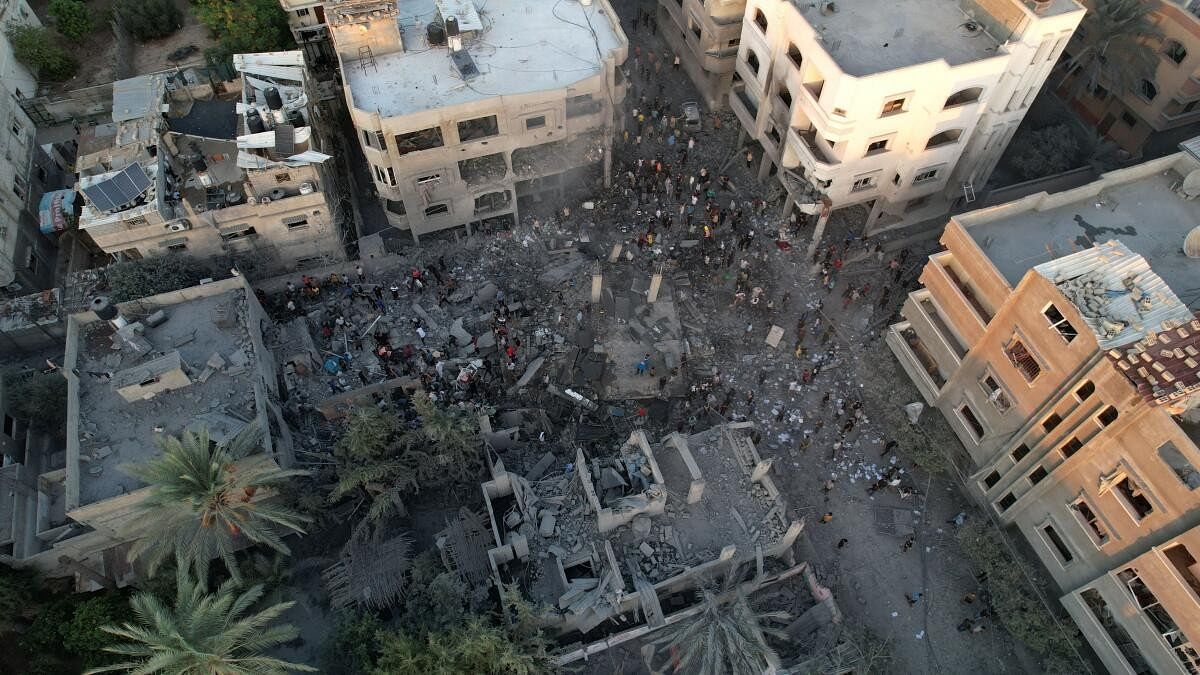
People gather at the site of Israeli strikes on houses in the central Gaza Strip, October 18, 2023.
Credit: Reuters Photo
Amid falling bombs, dwindling supplies and the devastating news of hundreds killed in an explosion at a hospital in Gaza City, those who sought safety in the southern Gaza city of Khan Younis woke up Wednesday to what one called “another day of hell.”
Yousef Hammash, an aid worker with the Norwegian Refugee Council, left his house in the north of Gaza last week with his mother, wife, two children, his sisters and his nephews following Israel’s evacuation orders. He was scouring the city early in the morning for water and bread when a missile fell nearby. Then another one. And then two more.
“There were hundreds of people in the streets, panicking and running,” Hammash, 31, said in a voice message that he managed to send in a rare moment of internet connection. “Whenever a rocket strikes, you don’t know where to go.”
The blare of ambulance sirens did not stop, Hammash said, and the city was bombed through the night.
He added: “I don’t think we can handle the situation much longer.”
Last week, Israel ordered all of Gaza’s northern residents — some 1.1 million people — to abandon their homes “for their own safety” and head south, before an expected ground invasion of the Gaza Strip. Hundreds of thousands obeyed, leaving by car and motorcycle and even on foot.
But despite its declarations, Israel on Tuesday intensified its bombings of the southern cities of Khan Younis and Rafah. It had already cut off Gaza’s water and electricity and imposed a “total siege,” refusing to allow any supplies to come into the blockaded territory.
On Wednesday, the situation grew even grimmer.
According to the International Committee of the Red Cross, three out of five wastewater plants in Gaza are no longer functioning, and two desalination plants were out of operation, leaving residents with no access to clean drinking water. There was a high risk of wastewater flooding, potentially creating a rise in the risk of disease outbreaks.
More than 2 million Gaza residents also struggled to communicate with the outside world — and with one another. Telecommunications towers destroyed by Israeli missiles and power outages meant that it was almost impossible to get online or make phone calls.
“We are disconnected,” Hammash said. “We don’t have internet, and even for the local phones, you have to keep on calling 30, 40 times just to check on your relatives and loved ones.”
And as the territory was running out of fuel to run backup generators, hospitals risked “turning into morgues,” the International Committee of the Red Cross said. Not only were they overflowing with a record number of injured people, they were also increasingly being targeted by airstrikes.
The World Health Organization has recorded 51 attacks on health care infrastructure in Gaza since the violence erupted last week, and 15 health care workers killed while on duty in what the organization described as violations of international humanitarian law.
All that time, aid shipments were backing up at the Rafah border crossing between Egypt and the Gaza Strip, but it was not being allowed inside the blockaded territory. The International Committee of the Red Cross said it had assembled 60 tons of medical items, and the WHO said its shipments of medical supplies and equipment had been lined up at the border for the past three days. The European Union sent a humanitarian cargo flight with shelter, water, sanitation items and medicines to Egypt, with another one expected Thursday.
There was some reason for hope late Wednesday, when Israel said it would not block deliveries to Gaza from Egypt. There was no immediate comment from Egypt. But aid agencies warned that even if the aid gets in, there has to be a reassurance that it can be safely distributed throughout Gaza.
“There is an urgent need for fuel, food, water and, of course, medical supplies,” Dr. Richard Peeperkorn, the WHO representative for the occupied Palestinian territory, said in a virtual news conference. “The supplies are ready. They are waiting at the border to be let in.”
He added: “This horror has to stop.”